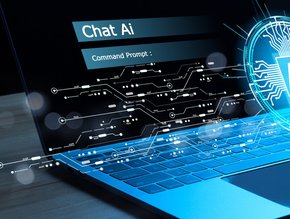Microsoft patents chatbot for ‘talking to dead people’

In a move more akin to an episode of Black Mirror than reality, Microsoft has filed a patent for an AI-driven chatbot that could make conversations with the recently deceased a reality.
Called "Creating a Conversational Chatbot of a Specific Person," the newly filed patent sounds relatively inoffensive. The idea is based on the principle that the more information artificial intelligence is given, the more accurately it can meet our expectations. The patented chatbot would be capable of expressing itself in the manner of a specific person.
But this could theoretically pave the way for “chatting” virtually with someone who is no longer physically present, or someone who is no longer alive.
The scenario is uncannily like the Black Mirror episode, Be Right Back, where a bereaved widow signs up to an AI chat service so that she can speak to an artificially generated version of her lost love.
As in the sci-fi driven episode, Microsoft's chatbot would evolve and become more 'person-like' the more information it is 'fed'. It could also learn to adapt and copy the deceased person’s character to the degree that it becomes capable of speaking convincingly with someone close to that person in a natural way.
Data trawling
To create a convincing AI version of the dead person, the chatbot would need to gather as much data on the deceased as possible, harnessing the vast swathes of online information held on social media sites to recreate the recently-deceased’s personality.
An extract from the patent states, “In aspects, social data (e.g., images, voice data, social media posts, electronic messages, written letters, etc.) about the specific person may be accessed. The social data may be used to create or modify a special index in the theme of the specific person's personality.”
However, such technology raises concern, particularly in the field of identity theft. The implications for such reality-based personality imitation are deeply unsettling. It’s worth noting that artificial intelligence would not only copy dead people as it can also be used to recreate someone who is alive.
Legal safeguards would inevitably be implemented by Microsoft, but the generation of a character based on information taken from online sources opens a can of worms in terms of privacy violation, digital data rights and information ownership.
As Andrew Paul of Input writes, “Does the digital assistant modelled after yourself circa 2006 that you drunkenly purchased as a goof truly belong to you? Or is that 16-year-old "you" — you know, the you with an embarrassing obsession with The Decemberists, suit vests, and suspenders — property of Bill Gates in perpetuity?”
A question of ethics
In South Korea and the US, technology companies are already investigating ways to keep the dead alive in a digital afterlife. Most existing services only enable people to sign up to their digital afterlife while still alive. Augmented and virtual reality has already been piloted in strangely disturbing 'back from the dead' experiences.
In February, the world watched uncomfortably as a grief-stricken South Korean mother had a tearful reunion with her VR generated, deceased seven-year-old daughter, seemingly brought back to life through a child actor, photos and her mother’s memories.
Faheem Hussain, a clinical assistant professor at Arizona State University’s School for the Future of Innovation in Society, explains, “Technically, we can recreate anyone online given enough data. That opens up a Pandora’s box of ethical implications.”
However, the data of dead people is not protected, thus the lack of regulation opens the floodgates in terms of access to the data of the deceased to bring them back to life in virtual form.
“In most countries in the world, the data of the deceased is not protected,” says Edina Harbinja, a senior lecturer in media and privacy law at Birmingham’s Aston University, adding, "So, nothing in the law would prevent the creation of an avatar or android that would resemble the dead".
Technically, this could infringe another person’s privacy if it includes conversations the person had with friends and others.
Mental health
The question of dealing with grief healthily would also be called into question by such technology. Chatbots providing mental health support are not a new idea. Anecdotal stories and studies suggest they can be helpful for people suffering from depression and social anxiety issues.
Facebook has already entered the arena of digital mental health. In October 2019, the social media giant launched its Let's Talk Stories filter and a series of Let's Talk Messenger, providing stickers - tools prompting people to begin conversations leading to support.
Antigone Davis, head of global safety at Facebook explains, “We found that private messaging can make it easier to talk about emotional or serious subjects. In fact, 80% of people who use messaging apps feel they can be completely honest when messaging versus in person.”
However, this chatbot tool does not emulate real people or use their social media data in a mimicking manner. But if the Microsoft patent comes to fruition, it could be possible to satisfy the longing to communicate with a dead loved one, despite the obvious repercussions of such an action.
“Human society as a whole is creating more digital footprints than ever before,” Hussain concludes. “One of the certainties in life is that we are going to be dead, so where’s the design for that?”
- At DTW24, TM Forum leads the way for the AI-Native telcoTechnology & AI
- Sustainability Focus Increasing Across Telecoms IndustrySustainability
- Powering a Smartphone with AI: Apple and OpenAI in TalksTechnology & AI
- Manish Mangal Becomes Tech Mahindra CTO for Telecom BusinessTelecommunications






